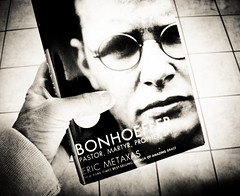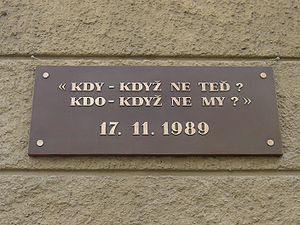
A dear friend of mine caused me to return to a book I had begun but had let languish, overcome by events and general busyness, since our vacation in late September: Eric Metaxas' Bonhoeffer—Pastor, Martyr, Prophet, Spy. As soon as I picked it back up I was hooked all over again. Metaxas' writing is like butter on warm cornbread, and Bonhoeffer's life is absolutely fascinating.
The tome is daunting, 542 pages exclusive of photos, endnotes, bibliography and author's bio. Yet every time I pick it up I am hard-pressed to put it down. I confess that I have never been much of a biography reader; still, I find that I am blessed I know not how on my journey by studying the lives of others. And Bonhoeffer is strong medicine, indeed.
I bring Metaxas' book up because I have been thinking a lot about truth over the past several weeks, and wondering how we got to such a state as we find ourselves today. As I was reading on the life of Dietrich Bonhoeffer I was struck by his assessment of the students at Union Theological Seminary,
and of the mainline Protestant churches in and around New York City when he studied in America in 1930-31. I was astonished to see evidence of the war against truth in his words:
There is no theology here... They talk a blue steak without the slightest substantive foundation and with no evidence of any criteria. The students... are completely clueless with respect to what dogmatics is really about. They are unfamiliar with even the most basic questions. They become intoxicated with liberal and humanistic phrases, laugh at the fundamentalists, and yet basically are not even up to their level (Metaxas, 101).
The theological atmosphere of the Union Theological Seminary is accelerating the process of the secularization of Christianity in America... [and] there is no sound basis on which one can rebuild after demolition. It is carried away with the general collapse (105).Metaxas writes of Bonhoeffer's observations:
In an attempt to be more sophisticated than the fundamentalists, whom they hated, [professors and students at Union] had jettisoned serious scholarship altogether. They seemed to know what the answer was supposed to be and weren't much concerned with how to get there. They knew only that whatever answer the fundamentalists came up with must be wrong. For Bonhoeffer, this was scandalous (103).Bonhoeffer found tepid faith in the churches he visited, with one exception:
Things are not much different in the church. The sermon has been reduced to parenthetical church remarks about newspaper events. As long as I've been here, I have heard only one sermon in which you could hear something like a genuine proclamation [of Christ and His atoning work for sin], and that was delivered by a negro (indeed, in general I'm increasingly discovering greater religious power and originality in Negroes). One big question continually attracting my attention in view of these facts is whether one here really can still speak about Christianity... There's no sense to expect the fruits where the Word really is no longer being preached (106).All this in 1931. This has been going on much longer than I think we imagined. And perhaps it was not new even then, considering the work that needed to be undertaken in the great councils of the early church. The real truth is that the Enemy can't come up with any new lies. Same girl, different red dress.
Let me encourage you to check out Metaxas' Bonhoeffer from your local library, or even purchase it for yours. You will find a great story of a great theologian, as told by a great writer. And you'll love to compare the cover picture with the author's photo on the flyleaf!



